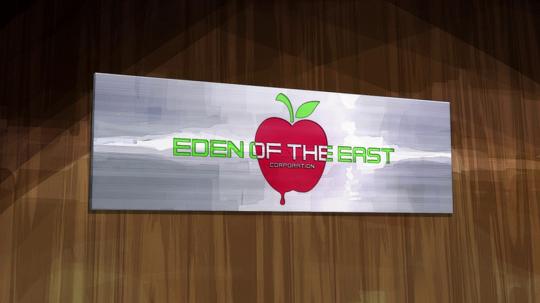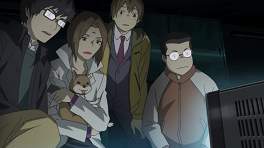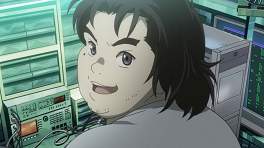Part two of why the Production I.G. produced, Kenji Kamiyama written and directed series, Eden of the East, isn't for you. Part one is also available.
3. You're (probably) not living in a post-apocalyptic country
Kanji Kamiyama did not live through the decimation of Hiroshima and Nagasaki, nor was he even born during the rapid rebuilding of the cities. His childhood was however set against an era of Japanese history that saw the political emasculation of the American occupation and the fallout from the woefully misguided Greater East Asia Co-Prosperity Sphere. Xenophobia was high and without a standing military force to protect them, the national feeling of powerlessness was great; but even recently those feels have been brought into sharp focus with North Korea's brazen firing of a rocket towards the Japanese mainland.
Eden of the East's Careless Monday incident - where eleven missiles struck populated areas around Japan - and the further attacks depicted in the series and movies speak to a very fundamental part of the psyche for many Japanese. Despite being in speculative fiction, these are not baseless fears and though some foreign viewers may have lived through the Cold War's Duck and Cover drills, when survivors of the only nuclear attacks in history are still present in society the threats of attack from outside aggressors depicted in the series are made more poignant.
The response to Careless Monday though is all the more fascinating. With the lack of casualties it's relayed by Saki that the media was whipped into a frenzy of speculation - there was no shock-and-awe military response from Japan and it had no more weight than a particularly scurrilous political scandal. The youth in Eden of the East never dealt with the omniscient threat of attack or invasion, and Careless Monday was a reminder of a turning point in Japan's history - a period Mr Outside lived through - as well as its place as a country in the larger world.
As the events of Careless Monday were revealed, did the absurdity and implausibility of the situation override all or was there a nagging feeling that the possibility and the response hit a little too close to home?
4. It doesn't focus on what you expect
How many anime series do you know of that focus on characters not in high-school? How many can boast a focus on arguably the most turbulent period of time - when schooling has finished and the rest of one's life stretches inexorably out before them? Eden of the East isn't about Pants, the shut-in über-hacker responsible for a prognosticating computer program; it's not about Micchon the programmer extraordinaire; it's not even about Satoshi who pines endlessly for Saki. It's about a capricious girl who doesn't know what she wants to do with life and a paper-boy who got forced into the high-stakes game of a billionaire eccentric. They are victims of circumstance and Akira's altruism and Saki's determination turn them from unlikely protagonists into worthwhile heroes, free from cliché and familiarity.
Similarly the story diverges from the techno-fetishism of the phones and Juiz, the mystery of the twelve Seleção and Mr Outside's antagonistic posturing into a politically-tinged diatribe on the young versus the old, usurpers versus the establishment. Many of the Seleção and their movements are entirely ignored throughout the series, just as Akira's past is never truly hammered down and it can seem like story threads are left dangling until the realisation that only what has been necessary to tell the story has been divulged.
It all starts in the first episode when Akira utilises the Japanese embassy to obtain tickets back home; it's a throwaway line to Saki in the airport but it demonstrates not only that he is smart and pragmatic, but that if the audience wishes to keep up, they need to be as well. The Juiz system is never gifted with the exposition that they are artificial-intelligence units but, like the unknown Seleção, the truth about them is largely unimportant. It is storytelling at its most judicious and its most adult, understated emotions to unimportant problems, it is the antithesis of the brain-dead mollycoddling so many other series, anime or otherwise, perform.
So when you first sat down to Eden of the East, unfolding the expected structure of one Seleção per episode, the antagonist Mr Outside lurking, waiting to be defeated, and the seductive sounding Juiz to reveal, it was the assumptions built by other sloppy series that lead to that befuddling disjoint that for some, never wore off.





I actually got a completely different feel from post 9/11 America. There was a lot of anger going around, and the student reaction wasn't as passive as the reaction of the people in Eden of the East's reaction was either. And I think that the threat of terrorist activities was still very real in Western society, though probably not America. Between the multiple train bombings in Europe, I'd be surprised if people there weren't pretty scared about terrorism. I'm still unsure of this "isolationist" attitude that you describe, because that seems to be a product of the long, dragged out wars in the Middle East, and doesn't reflect the sentiments of people just a few months into the war in Afghanistan.
And about point 4, now I see where you're coming from. Yeah, the focus is certainly different from the normal school setting, which is really what a lot of people expect from anime. On the other hand, I still can't agree with the point about broken plot points. The thing with a lot of viewers is that they expect everything to get tied up nicely with a bow on top. Even if the missing Selecao was not pertinent to the plot, the average viewer would still want all of them to be revealed.